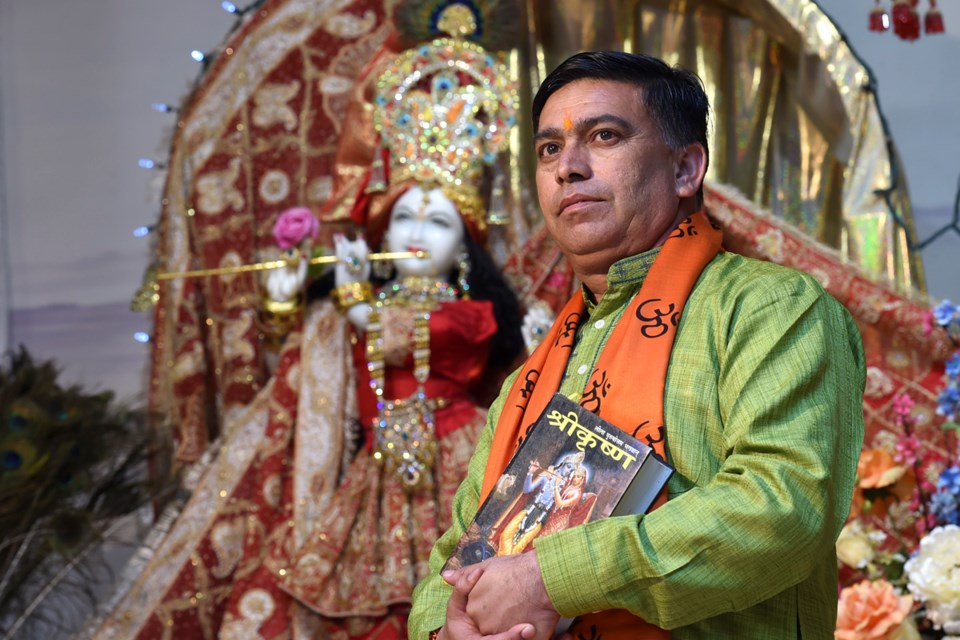As Saturday night became Sunday morning, Hindus in Vancouver and worldwide marked Krishna Janmashtami, the birthday of Krishna, the most venerated figure in the Hindu pantheon.
In fact, at the Vedic Cultural Centre on Number 5 Road in Richmond — known as “the highway to heaven” for its density of religious buildings — festivities began a week earlier, with revelry and meals served every night in the lead-up to what Malti Singh, a founding member of the centre, says is the most important holiday in the calendar. I spoke with Singh and, with her translating, to Pandit Chaman Lal, the priest of the adjacent Ram Krishna Mandir. (A mandir is a Hindu temple. Pandit is the honorific for priest or teacher, and is sometimes spelled pundit, from which English corrupted that word.)
Krishna came, Singh says, “to spread the divinity, the spirituality, the truth, the path of realization, yoga, love and devotion, not only to just the supreme divine figures but to mankind.”
Krishna is believed to have lived in the third millennium before the common era, a time when Singh says “unrighteousness was spreading… just like what we are having now. He appeared on the planet and spread the path of righteousness.”
Krishna is considered the most important and powerful incarnation of Vishnu, who in turn is the supreme being for many Hindus, depending on tradition. He is, according to Singh, the most popular of all the avatars, or incarnations, of Vishnu. Dark, handsome and mysterious, he broke the hearts of many girls, she says. He is considered a protector, philosopher, teacher and friend.
Because he is the killer of evils, the narratives in which Krishna features abound with violence. Even in his childhood, he was slaying demons and dispatching serpents, killing one female demon by suckling her breasts. As a youth, he returned to the town of his birth, killed his uncle, King Kamsa, along with all the king’s evil cronies, and freed his imprisoned parents.
In another instance, he is said to have lifted up a mountain with one finger and used it as an umbrella to protect townsfolk from torrential rains caused by an annoyed Lord Indra.
As the enemy of evil, Krishna was a great warrior. After easily triumphing over multiple millions of enemy soldiers, Krishna built a “many gated” city on an island (which an epic poem says is now submerged) in the sea off Gujarat.
After defeating the demon King Nakasura, Krishna is said to have freed the 16,000 princesses the king had abducted. Since they had nowhere to go, Krishna married them all.
In an epic battle, Krishna volunteered to serve as charioteer for the master warrior Arjuna. It was during this war, when Arjuna had a crisis of conscience, that Krishna delivered his most enduring advice, which takes the form of the holy book, the Bhagavad Gita. In it, Krishna extolls “Nishkam Karma,” action without attachment, or selflessness in the service of a greater good.
But Krishna was not only a warrior, he was a lover as well. He worked hard and he played hard and is perceived as showing god’s playful, mischievous, sensual side.
Playing his flute and dancing soulfully, Krishna captured the affections of the cowherdesses of Gokul. One of his exploits involved stealing butter, which has come down through the ages in the form of young men marking his birthday by forming a human pyramid to reach a pot of butter (or, more often, buttermilk), smashing it like a pinata and being drenched in the contents.
Like many aspects of Krishna Janmashtami — and Hinduism generally — these rituals vary greatly by region. Hinduism differs sharply from most other religions. No single founder is acknowledged and no single body of teaching is universally accepted. While Hinduism is by far the dominant religion in India, Hindus make up a small part of Vancouver’s multicultural mix. About 1.4 per cent of Vancouverites, according to the 2011 census, are Hindu. (There are twice as many Sikhs.)
At the Vedic Centre in Richmond, Saturday night and the week leading up to it were filled with festivities.
“We start eight days before,” says Singh, “to purify, to bring the people into this celebration. They start doing the prayers, the chanting, they start reading and we start distributing free meals once a day and it goes on for seven days. On Saturday is the real celebration. [Krishna is said to have] appeared in the in the dark moon, so we celebrate at midnight, at 12 o’clock.”
The epic stories surrounding Krishna are colourful and numerous, but Lal, the priest, sums up his legacy simply.
“He came to spread righteousness,” Lal says, “to install the power of truth on the planet.”



